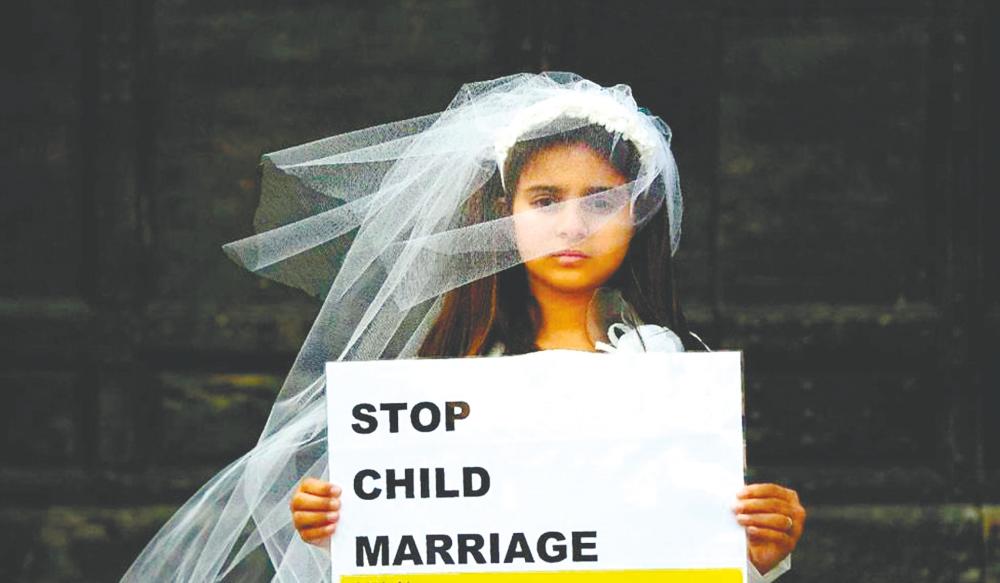WITH the theme “Listen to the Future”, this year’s World Children’s Day reminds us to listen to the troubles and needs of the future generation. The to-do list is long, but one issue depriving some of our children of childhood continues to be tolerated: child marriage.
Prevalence of issue
Statistics on child marriage in Malaysia are not regularly published but time-series statistics show a declining trend.
My calculations based on publicly available census data show that the percentage of children aged 10 to 17 married, divorced or widowed was just below 1% in 2000, a decline from about 4% in 1970.
More recently, 1,124 child marriages were recorded in Malaysia in 2020. Assuming that in these marriages both parties were children aged at least 10, this would mean just 0.04% of children and adolescents aged 10 to 19 were married in 2020. While this figure is a rough estimate due to various assumptions, it highlights that, statistically, child marriage remains a relatively rare phenomenon.
However, for children who tie the knot, the ramifications of marriage during these pivotal developmental years cannot be underestimated.
Effects on children
According to Girls Not Brides, a non-governmental organisation (NGO), children who marry have significant physical and mental health consequences. Girls who marry before the age of 15 are 50% more likely to suffer from intimate partner violence than those who marry later, and
pregnancy complications are the leading cause of death among girls aged 15-19.
Child marriage often results in children dropping out of school and never returning. Real-life cases highlight the troubling acceptance of child marriage in Malaysia.
In 2018, an 11-year-old girl married a 41-year-old man in Kelantan. The man had stated, “One day I will take this girl as my wife”, four years before the marriage took place – raising concerns of sexual grooming. This means he intended to marry her when she was only seven years old.
In some cases, children are even married off to their rapists. For example, in 2012, a 13-year-old girl was married to her 19-year-old rapist in Kulim, Kedah. These cases are not isolated, and reflect systemic issues perpetuated by societal and legal shortcomings.
Policies and laws
In 2020, the Women, Family and Community Development Ministry launched the National Strategy Plan in Handling the Causes of Child Marriage. The plan takes a comprehensive approach in tackling child marriage, addressing issues such as poverty, improving access to education, and expanding sexual and reproductive health services.
Additionally, the plan also includes a proposal to raise the minimum marriage age to 18 for all individuals. Unfortunately, the government falls short of meeting this goal.
In Malaysia, family law is contingent on a person’s religion and state of residence. For Muslims, Islamic family law stipulates the minimum marriage age for girls at 16 and boys at 18. However, by 2022, Selangor and Kedah had amended their state laws to raise the minimum age for girls to 18. Discouragingly in 2022, the then minister of Women, Family and Community Development announced that the federal government had no plans to pursue a nationwide ban on child marriage, citing resistance from many states to amend their laws.
Resistance to reforms
Despite the relatively low number of child marriages each year, it is surprising that some states are slow or even reluctant to make changes. One possible explanation is that the low prevalence of child marriage makes proposing legal amendments a low priority in state legislative assemblies.
However, a more compelling reason may lie in resistance from those in power. In the past, bureaucrats in states like Sabah, Terengganu and Kelantan have opposed marriage reforms, arguing that the legality of child marriage is necessary in exceptional circumstances – such as to “protect” a child’s dignity from premarital sex, whether consensual or not.
Lack of political will and consensus
There appears to be a lack of political will, and without the consensus of legislators and state authorities, protecting children from a deprived childhood will remain unachieved.
While Selangor and Kedah have amended their laws, loopholes persist as long as children can still be married in other states.
Malaysia now lags behind its regional neighbours, as countries like Indonesia and the Philippines have passed laws recognising the human rights violations associated with child marriage. Thailand raised its minimum marriage age to 17 back in 2018.
The Madani government must push through in meeting the objectives of the National Strategy Plan in Handling the Causes of Child Marriage. With the support of community leaders and NGO, it must continue to have dialogues with state governments to ensure child abuse is not concealed behind the veil of a child bride.
The writer is a researcher at the Khazanah Research Institute and a research student at the Graduate School of Public Policy, University of Tokyo.
Comments: letters@thesundaily.com









